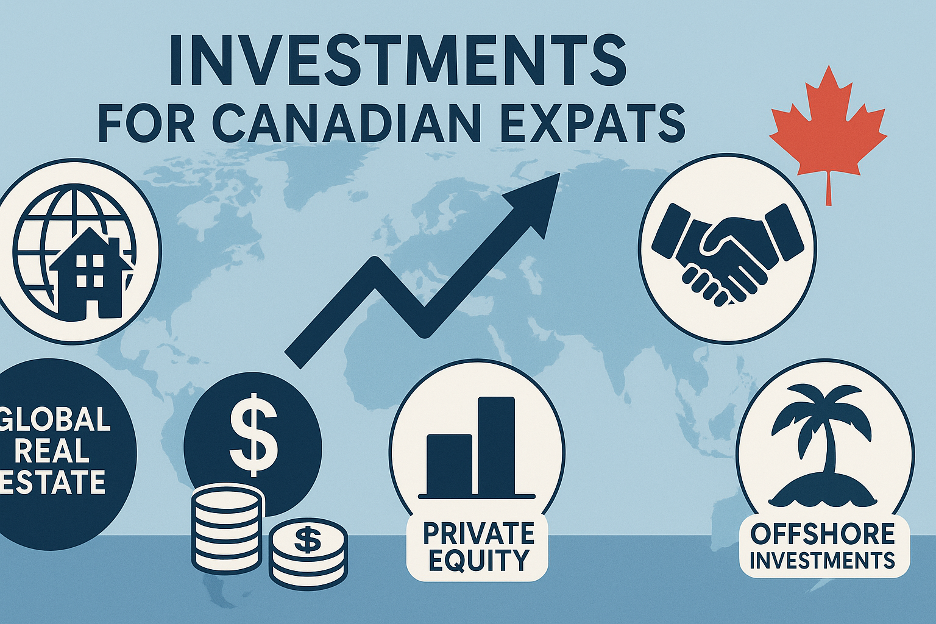Canadian expats can invest through a mix of registered accounts retained in Canada—such as RRSPs, RESPs, and RDSPs—non-registered investment accounts, Canadian real estate, or offshore and host-country investment accounts.
Other options include globally diversified ETFs, mutual funds, REITs, and alternative investments such as hedge funds and private equity.
The best choice depends on tax residency, local regulations, and personal financial targets.
Innovest Global Wealth published the article in collaboration with the esteemed financial wealth manager and expat, Adam Fayed, from www.adamfayed.com
You can reach us via WhatsApp at +256773488765 and +44 7393 450 837 or by email at info@innovestglobalwealth.com and hello@adamfayed.com
Canadian Expat Investing.
Canadian expats must consider local financial systems, limits on Canadian-registered accounts, and tax residency when investing from abroad.
How to determine tax residency in Canada
Canada classifies tax residency based on ties:
· Primary: Home, spouse/common-law partner, dependents in Canada
· Secondary: Bank accounts, driver’s license, memberships, healthcare coverage
· Spending 183+ days in Canada without establishing residency elsewhere triggers deemed residency.
Do Canadians pay tax if they live abroad?
- Residents: Taxed on worldwide income; foreign tax credits can reduce double taxation.
- Non-residents: Taxed only on Canadian-sourced income:
- Dividends: 25% withholding tax (may be reduced by treaty)
- Interest: Usually exempt
- Capital gains: Mostly exempt, except taxable Canadian property
- Non-residents must also follow host-country tax rules.
What are the top investments in Canada?
Canadian expats can invest in registered or non-registered accounts, depending on their residency status.
These allow exposure to stocks, bonds, ETFs, mutual funds, and alternative investments, with tax treatment varying for residents and non-residents.
Registered Retirement Savings Plan (RRSP)
· Tax-deferred growth, withdrawals subject to withholding tax for non-residents
· Contributions are usually restricted for non-residents.
Tax-Free Savings Account (TFSA)
· Growth is tax-free in Canada
· Non-residents cannot contribute; gains may be taxable abroad.
Registered Education Savings Plan (RESP) / Registered Disability Savings Plan (RDSP)
· Can be maintained abroad, but contributions and government grants may stop
· Withdrawals may trigger tax in the host country.
Non-Registered Accounts
· Flexible investment options: stocks, bonds, ETFs, mutual funds, alternatives
· Dividends may face withholding tax; interest usually exempt; capital gains generally tax-free
· Must report income to host-country tax authorities
Canadian non-resident buying property in Canada
Non-resident Canadians can invest in Canadian real estate, but rental income is subject to 25% withholding tax, and capital gains are taxable.
Compliance with CRA rules, including filing NR6 or obtaining a Certificate of Compliance, is required to avoid penalties.
· Rental Income: 25% withholding tax on gross rent; can file NR6 to pay tax on net income
· Capital Gains: Buyer withholds 25% of the sale price until the Certificate of Compliance (Form T2062) is obtained
· Real estate income may also be taxed in the host country.
Offshore investing for Canadians
Offshore accounts give expats access to global markets outside Canada. These accounts can hold international ETFs, mutual funds, REITs, and alternative investments such as hedge funds and private equity.
They are helpful for diversification, tax planning, and accessing opportunities not available in Canada or the host country, but require careful compliance with both Canadian and local tax laws.
Offshore investments are particularly useful for Canadians who plan to stay abroad long-term.
Alternative Investments
Canadian expats seeking higher returns or specialized investment strategies can consider alternative assets.
Key options:
- REITs: Invest indirectly in global real estate markets without owning physical properties, through public listings or private funds.
- Hedge Funds and Private Equity: Typically offered via offshore or premium platforms, these investments pursue opportunities in venture capital, distressed assets, or leveraged strategies.
These higher-risk investments usually require larger capital commitments, careful research, and financial planning and advice.


